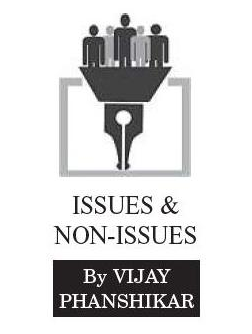The India Factor
| Date :12-Sep-2020 |

Washington, September 9 (PTI): A Republican campaign video that includes visuals from the two historic rallies of President Donald Trump and Prime Minister Narendra Modi in the last one year -- “Howdy Modi”, and “Namaste Trump” -- is making waves in the US ahead of the November 3 presidential election, particularly among Indian-Americans whose votes may be the deciding factor in some of the battleground states.
THE dominance of the India factor is, thus, evident in the United States readying for the presidential contest where President Mr. Donald Trump is seeking a second term. For the first time in American presidential contest, the India factor has assumed such importance, such primacy -- so much so that it may prove to be a determining point in the final outcome.
Those who had watched the two rallies -- “Howdy Modi” and “Namaste Trump” -- either personally or on television did not miss the influence the Indian diaspora enjoys in the Unites States and what kind of importance President Trump attaches to the Indian vote.
Let us cross-over to the other side so see what is happening. Democratic candidate Mr. Joe Biden has Mrs. Kamla Harris, an Indian American who has risen to significance in US politics in the last few years, as his running mate. Thus, on both sides of the divide, the Indian factor is operating, adding much value to the Indian vote, much credence to the Indian voice. This is unprecedented, to say the least.
Of course, this did not happen overnight. It took years of sincere inputs from the Indian diaspora in the United States. It also took a lot of careful and planned push to the wide-spectrum Indian interests in the US in the past few years -- especially after the ascendence of Mr. Narendra Modi as India’s Prime Minister and national leader.
However, when Mr. Narendra Modi pitched for Mr. Donald Trump at Houston’s “Howdy Modi” rally -- almost as in an election speech -- many, many people in India, with or without political leanings, felt slightly uneasy. They did recognise the influence Mr. Modi had on the mind of the Indian community in the US. They also realised the innate strength of the Indian vote -- in domestic American politics. In a way, they felt good as well of the shape of things. Despite that, they also harboured a doubt if Mr. Modi -- and India -- was making a mistake in taking sides in American elections that were -- at that point in time -- fairly away.
This point did come up during discussions on public forum or television interviews on political and diplomatic issues time and again, occasionally involving Minister of External Affairs Dr. S. Jaishankar (who authored a masterly book “The India Way: Strategies For An World. Anchors and interviewers asked him time and again if India made a mistake in openly supporting Mr. Trump as a presidential candidate.
Dr. Jaishankar’s response was a good example of classical, diplomatic thinking spurred by continued national interest. He said, in effect: India need not be apologetic about the issue. Prime Minister Mr. Modi and President Mr. Trump enjoyed a great chemistry. And Mr. Modi has developed a personal comradeship with President Mr. Barack Obama. During the two successive administrations in Washington across domestic political divide, India developed a great bonding with two leaderships.
This fine comprehension of evolving diplomatic, political and strategic bonds plus personal association has become the crux of India’s foreign policy management over the past some years. That was also the reason why M r. Modi has been able to strike great connect with two superpowers, the United States and Russia simultaneously taking care of India’s national interests.
What counts most is the India factor, so to say. There was a moment of anxiety when Mr. Trump growled that the US would not appreciate India taking an advanced Russian weapons system. But India and Mr. Modi were cool, sure that Mr. Trump would not misunderstand them pursuing their own agenda that did not militate against anybody else’s. If that was the message to Mr. Trump and Washington, the message to Mr, Vladimir Putin in Moscow also was clear -- India is a sovereign State to pursue its own way of thinking in consonance with its perception of national interest.
By now, the world has learnt to recognise this India factor. As the country gears for the November 3 presidential contest, both, the Republican and the Democratic, parties recognise and respect the indispensability of the India factor.The Democrats do understand that in the Indian context, Mrs. Kamla Harris bring only a marginal advantage to their campaign. For, India and Indians also know very well that Mrs. Harris is first and the last an American (which got highlighted well when she made pro-Pakistan statement with a near-total disregard to the official and actual Indian position in Kashmir).
Despite that, both the parties are sure of India’s fair mindedness and also of the ability of the Indian-American population to make its own electoral and political choice with India’s national interest in mind. This fine position become possible only because of the immense maturity in India’s foreign policy management plus the great socio-cultural and political reconnect with the diaspora not just in the US but across the world.
The political leadership across ideological divide in the US recognises the importance of the India factor from such multiple ways. For them, the India factor does not become a part of the electoral arithmetic but also an integrated association of a rapidly changing world where India occupies a critical spot.